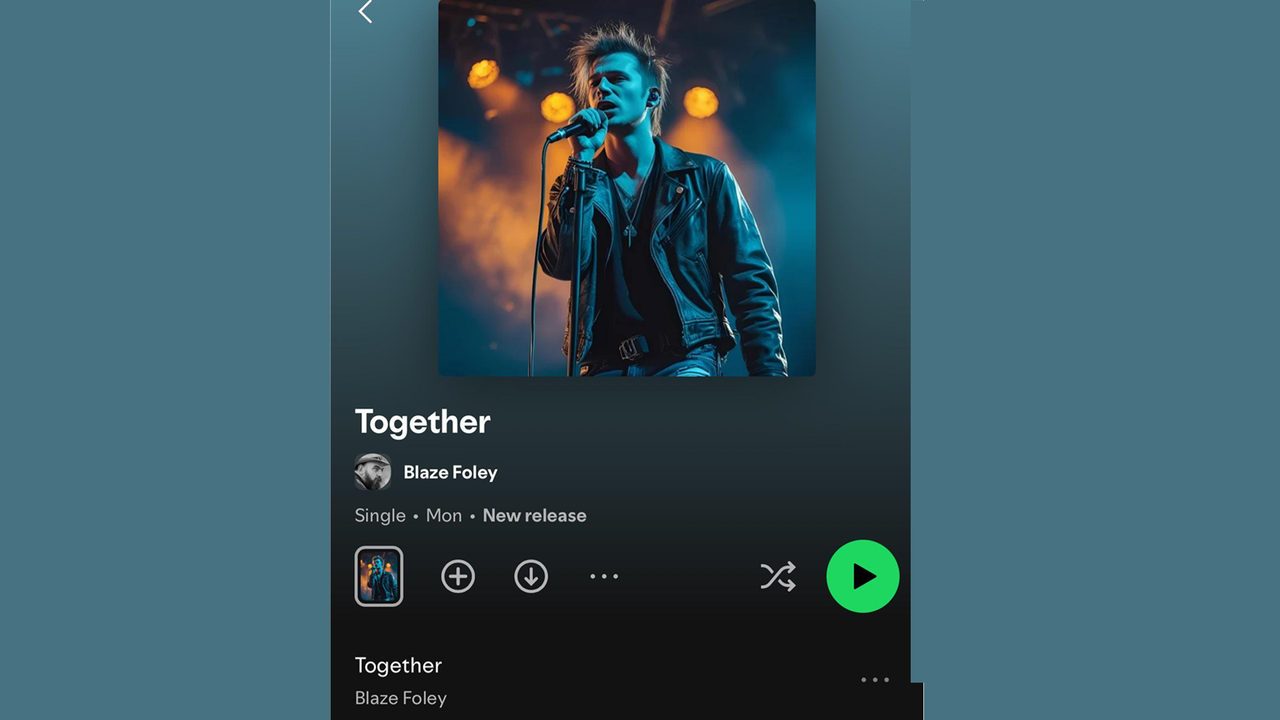- AI-generated songs by deceased artists, like Blaze Foley, have been falsely uploaded to Spotify
- The streaming service is taking them down as they’re noticed
- The tracks slipped previous Spotify’s content material verification processes by way of platforms like SoundOn
Final week, a brand new nation tune known as “Collectively” appeared on Spotify below the official artist web page of Blaze Foley, a rustic artist shot and killed in 1989. The ballad was not like his different work, however there it was: cowl artwork, credit, and copyright data – identical to another new single. Besides this wasn't an unearthed observe from earlier than his loss of life; it was an AI-generated faux.
After being flagged by followers and Foley's label, Misplaced Artwork Information, and reported on by 404 Media, the observe was eliminated. One other faux tune attributed to the late nation icon Man Clark, who handed away in 2016, was additionally taken down.
The report discovered that the AI-generated tracks carried copyright tags itemizing an organization named Syntax Error because the proprietor, though little is understood about them. Stumbling throughout AI-made songs on Spotify isn't uncommon. There are whole playlists of machine-generated lo-fi beats and ambient chillcore that already rake in thousands and thousands of performs. However, these tracks are usually introduced below imaginary artist names and often have their origin talked about.
The attribution is what makes the Foley case uncommon. An AI-generated tune uploaded to the improper place and falsely linked to actual, deceased human beings is many steps past merely sharing AI-created sounds.
Artificial music embedded straight into the legacy of long-dead musicians with out permission from their households or labels is an escalation of the long-running debate over AI-generated content material. That it occurred on an enormous platform like Spotify and didn't get caught by the streamer's personal instruments is understandably troubling.
And in contrast to some instances the place AI-generated music is handed off as a tribute or experiment, these have been handled as official releases. They appeared within the artists’ discographies. This newest controversy provides the disturbing wrinkle of actual artists misrepresented by fakes.
Posthumous AI artists
As for what occurred on Spotify's finish, the corporate attributed the add to SoundOn, a music distributor owned by TikTok.
Join breaking information, opinions, opinion, prime tech offers, and extra.
“The content material in query violates Spotify’s misleading content material insurance policies, which prohibit impersonation supposed to mislead, akin to replicating one other creator’s identify, picture, or description, or posing as an individual, model, or group in a misleading method,” Spotify stated in a press release to 404.
“This isn’t allowed. We take motion towards licensors and distributors who fail to police for this sort of fraud and people who commit repeated or egregious violations can and have been completely faraway from Spotify.”
That it was taken down is nice, however the truth that the observe appeared in any respect suggests a problem with flagging these issues earlier. Contemplating Spotify processes tens of 1000’s of recent tracks each day, the necessity for automation is apparent. Nevertheless, which means there could also be no checking into the origins of a observe so long as the technical necessities are met.
That issues not only for inventive causes, however as a query of ethics and economics. When generative AI can be utilized to fabricate faux songs within the identify of useless musicians, and there’s no quick or foolproof mechanism to cease it, then you need to surprise how artists can show who they’re and get the credit score and royalties they or their estates have earned.
Apple Music and YouTube have additionally struggled to filter out deepfake content material. And as AI instruments like Suno and Udio make it simpler than ever to generate songs in seconds, with lyrics and vocals to match, the issue will solely develop.
There are verification processes that can be utilized, in addition to constructing tags and watermarks into AI-generated content material. Nevertheless, platforms that prioritize streamlined uploads might not be followers of the additional effort and time concerned.
AI generally is a useful gizmo for serving to produce and improve music, however that's utilizing AI as a instrument, not as a masks. If an AI generates a observe and it's labeled as such, that's nice. But when somebody deliberately passes that work off as a part of an artist’s legacy, particularly one they will not defend, that’s fraud. It might appear a minor side of the AI debates, however individuals care about music and what occurs on this business might have repercussions in each different side of AI use.
You may also like
- Is AI dangerous for music or is it simply one other step within the auto-tune timeline?
- AI music makers face recording business authorized battle of the bands that would spell hassle to your AI-generated tunes
- Google has tuned up its AI Music Sandbox for musicians and producers
